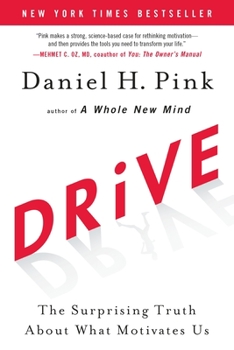Motivation (Pink part 1) (2011)
Originally published as a Facebook Note May 31, 2011.

A group of us at Coe are reading and commenting on Drive: The Surprising Truth About What Motivates Us by Daniel H. Pink. Malcolm Gladwell calls is "provocative and fascinating," and so it is. Here's what the first three chapters provoked from me:
Pink makes two claims which occur side-by-side in the first part of his book. The first is that traditional material incentives (pay, prizes, grades) are not as effective as conventional wisdom would have it. For many people, intrinsic incentives, such as personal interest and connection with others, are more effective. The second claim is that however individuals happen to be motivated, intrinsic motivation is better than extrinsic motivation at fostering creative problem-solving, productivity and job satisfaction. Employers would do well to hire people who are intrinsically-motivated, and those of us who are more extrinsically-motivated would do well to work on developing intrinsic motivation.
I am resisting jumping on this with both feet because it seems unbelievably wonderful. I can’t comment from the perspective of the business world, because as I am frequently reminded by scoffers, I have never met a payroll. I have, however, filled a gradebook or two, and I long since learned the resources I have to motivate students through grades are pretty meager. Students who are motivated by grades do the minimum necessary to achieve the grade they want, but put enormous energy into protesting if their grades fall short of their goal. Students who are self-motivated, by contrast, spend more time preparing for class, more time reflecting on the material, and contribute spectacularly to class discussions. They are joys to teach. Classes go better when students are self-motivated. In my classes, self-motivation among students ebbed in the late 1990s, and peaked in the middle of the last decade. My own job satisfaction fell and rose with it.
The book has me thinking along a number of lines. To prevent my comments from numbing your brain, you can stop here, or read some of the following, labeled paragraphs.
Types of extrinsic motivation. Pink treats extrinsic motivation as entirely material in nature: more pay, cooler rewards, higher grades. Self-examination finds these as not particularly interesting or powerful. I find, however, I am motivated to an alarming degree by the approval of others. Almost everything I do—from work and family to activities like music and volunteering—involves others, and I measure my success by how they react. I am only able to feel intrinsically rewarded when I am doing something by myself. I suspect I am not unusual in this respect, and the omnipresence of consumer satisfaction surveys these days suggests if I am people had better get with the program. Yet so far in the book this has no place in Pink’s theory. (For the record, when I took Pink’s survey at http://www.danpink.com/drive-survey, I was determined to be “mostly Type X,” so maybe the distinction isn’t being overlooked.
The folly of high expectations. A number of political theorists, most famously Karl Marx, believed that material rewards corrupt people, and pushed their belief in intrinsic motivation even farther than Pink does. In some of Marx’s early writings, at any rate, he argues that once political and social barriers are removed, people will do whatever is necessary for the community. This is true, up to a point—we do a lot for those we love—but not so much beyond that, as is seen historically in the tragic history of socialist dictatorships, and in my neighborhood piles of cigarette butts, fast food wrappers and dog poop. I just read a book about Gandhi, who would go to poor villages where people defecated in the road. He would take it upon himself to clean up after them, with the message that if he could do it they could do it, and look how much better it is to live in a poop-free village. He had few takers.
What can society support? As Pink suggests, our society is built on routine work, but is relying increasingly on creative effort. One barrier to this is the lack of social support for risk-taking. Conservative politicians argue that risk-taking is deterred by taxes on the financially successful, but I think the opposite is true. The lack of a social safety net in the United States means that the cost of failure is huge. With spells of unemployment longer, and more stigmatized, and with less and less access to important goods like health care, the chance for creative risk-takers to fall through the socioeconomic level required for intrinsic motivation is dangerously great. Can our society find a way to cushion the landing? Of course, a stronger safety net risks providing an incentive for people to do nothing at all and just live off the government. So, which is the greater danger?
Systems and non-systems. That people are motivated differently is obvious when you think about it. Students in a classroom, children in a family, drivers at an intersection when the traffic light’s out—a particularly vivid example to me after this morning!—behave differently. Ideally the work world, the academic world, the parenting world would be able to design work for each individual’s motivation. But as my traffic example shows, a lot of life today depends on systems that treat people as cogs rather than unique individuals. Even at our self-consciously small liberal arts college, I give the same exams to 20 to 30 people at the same time, and expect a very good reason when a student wants to take it at a different time. How individualized can we be in our classroom (or work) management?



Comments
Post a Comment